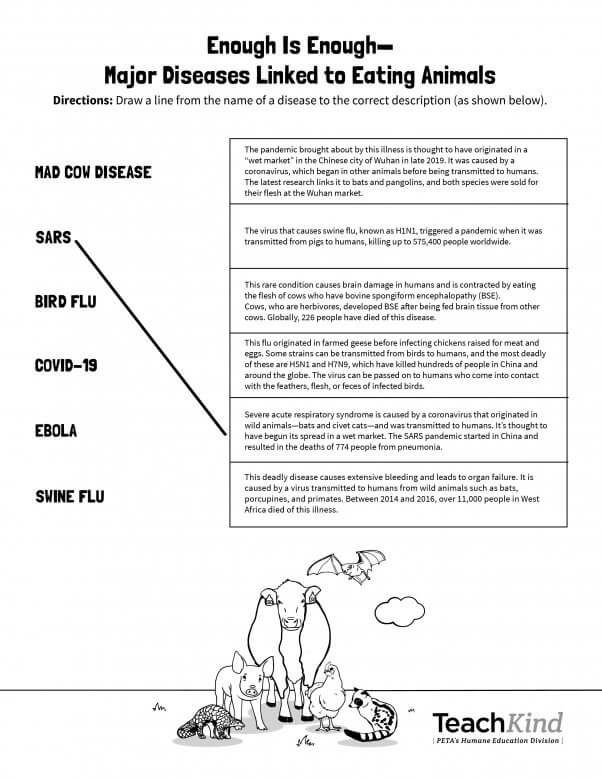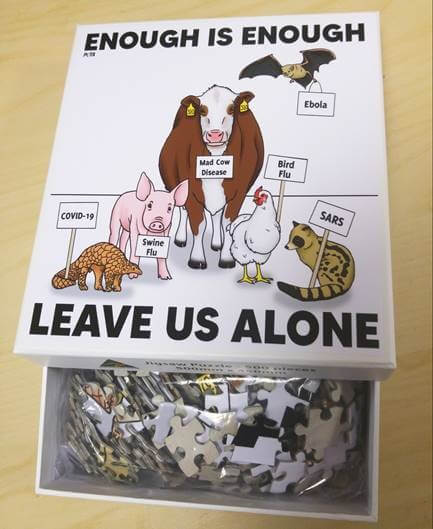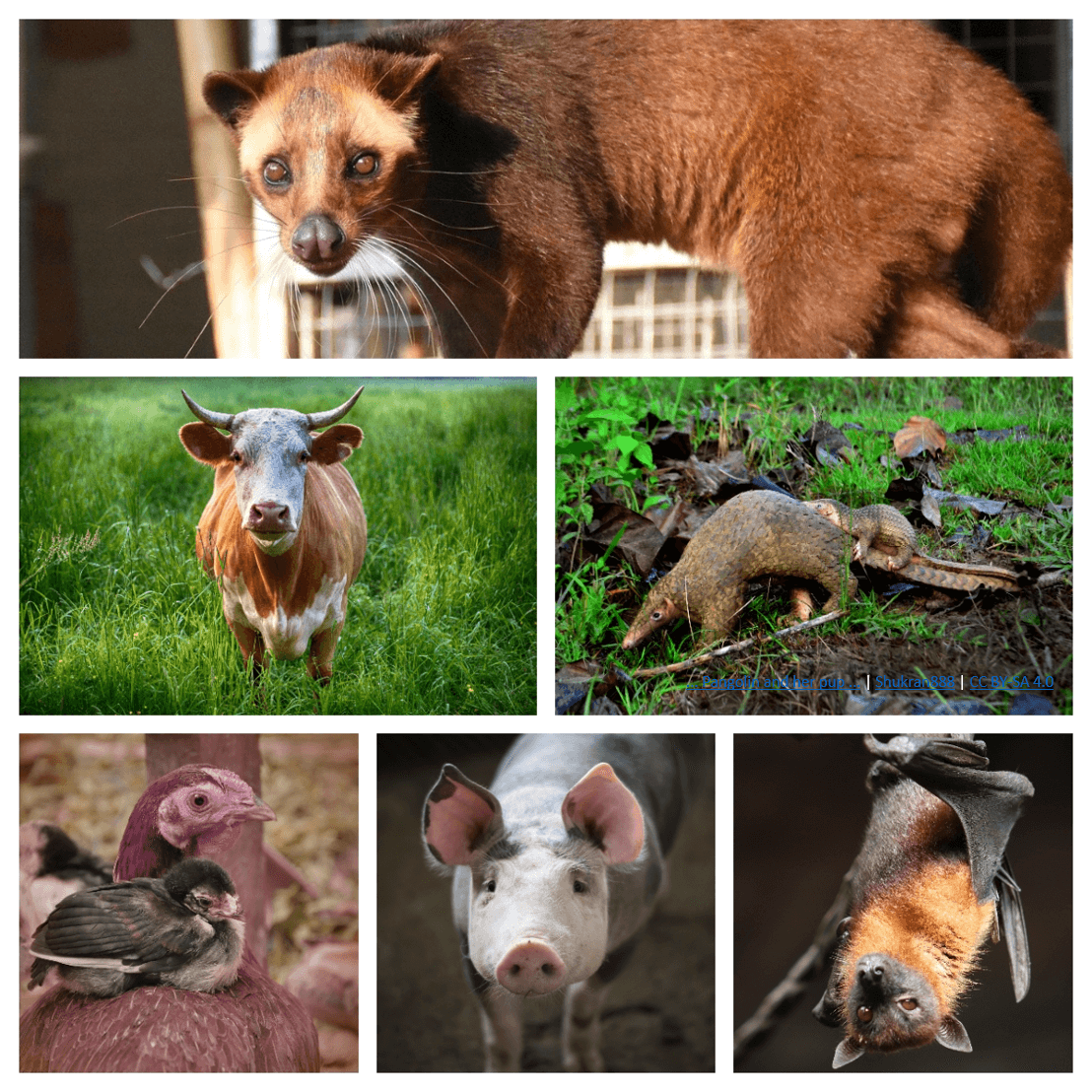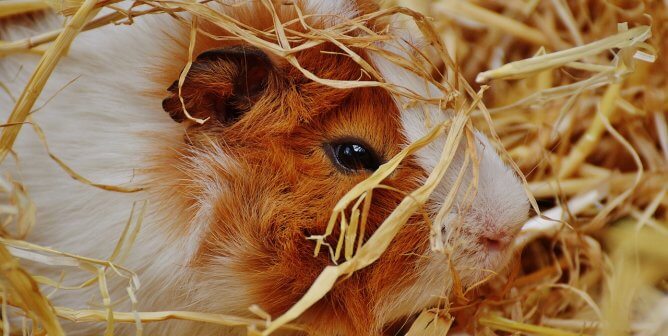Enough Is Enough: Current Events Lesson—Understanding COVID-19 and Preventing Future Zoonotic Diseases
As the COVID-19 pandemic grips the world, students are quarantining with their families and very likely questioning just how we got here. Discussing this major event can expose them to important new facts and help them synthesize information that may seem overwhelming. This will allow them to draw their own conclusions.

Use the following activity to help students in grades 9–12 examine the role that eating animals plays in global pandemics.
Motivation
Display the images of a cow, pig, chicken, pangolin, bat, and civet and ask students what these animals have in common. Then explain that humans kill and eat them, and let students know that all of these animals have been linked to global disease outbreaks.
Stand Up/Sit Down Activity—Global Pandemics
(The term pandemic has become better known because of the novel coronavirus, but you may still need to explain that it’s an outbreak of a disease that occurs over a wide geographic area and affects an exceptionally high proportion of the population.)
Read each statement below. If you’re conducting this lesson virtually, you can have students use agree/disagree or yes/no icons or other nonverbal feedback associated with the virtual platform. If you’re in a classroom, have students stand up if they agree with the statement. After each statement, have one student who agrees and one student who disagrees explain their opinion.
Tell students to use the nonverbal feedback icons (or stand up) if they agree …
- If other countries close down “wet markets,” that will prevent more pandemics. (The term wet market has become better known because of COVID-19, but you may still need to explain that it’s a market in which live and dead animals—including fish, birds, badgers, bats, pangolins, and turtles—are sold for human consumption.)
- Another global pandemic is inevitable.
- People in other countries, including the U.S., should stop killing and eating animals to help avoid future pandemics.
Reading and Cooperative Activity—Meat and Links to Disease
Tell students that these are the guiding questions for this activity:
- What is the link between meat consumption and outbreaks of infectious diseases?
- What credible sources are cited in the article?
If you’re in a classroom, you can divide students into groups and assign each group one article. Have the members of each group read their assigned article (and watch any videos embedded in it), discuss the guiding questions, and then prepare to explain the main points from their text to the whole class. If you’re conducting this lesson virtually, you can create the groups and assign the articles ahead of time. Students can discuss the guiding questions within their group by chatting in the online learning platform that you’re using for the lesson before the class comes together as a whole. Review their chats beforehand. Then discuss the main points of each article as a whole class.
- Meat and the Coronavirus
- Wet Markets vs. Factory Farms
- Will Bird Flu Be the Next Global Pandemic?
- Will Swine Flu Be the Next Global Pandemic?

This activity can help address these Common Core Learning Standards in reading, and speaking and listening:
Grades 9-10
Cite strong and thorough textual evidence to support analysis of what the text says explicitly as well as inferences drawn from the text.
CCSS.ELA-LITERACY.SL.9-10.1
Initiate and participate effectively in a range of collaborative discussions (one-on-one, in groups, and teacher-led) with diverse partners on grades 9–10 topics, texts, and issues, building on others’ ideas and expressing their own clearly and persuasively.
Grades 11-12
Cite strong and thorough textual evidence to support analysis of what the text says explicitly as well as inferences drawn from the text, including determining where the text leaves matters uncertain.
CCSS.ELA-LITERACY.SL.11-12.1
Initiate and participate effectively in a range of collaborative discussions (one-on-one, in groups, and teacher-led) with diverse partners on grades 11–12 topics, texts, and issues, building on others’ ideas and expressing their own clearly and persuasively.
Watch and Discuss
Protests to Shut Down Live-Animal Markets in the U.S. (8-minute video)
Discussion Questions
- Do you think it’s fair to demand that China shut down its wet markets, while wet markets remain open here in the U.S.? Why or why not?
- Should human consumption of animals continue? Why or why not?
Journal Question/Assessment
Have students respond to the question below in a journal in order to record their thoughts and explanations about the ideas covered in this lesson. It can also be used as a free-writing activity in which students can respond freely without having to worry about correct grammar, punctuation, etc. Review students’ writing to evaluate their understanding of the concepts from the lesson.
Ask yourself: What is my “universe of obligation” (my responsibility as a member of the global community) on this issue?
This is a big question for students to tackle, but it’s important for young people to recognize that humans have collective responsibility for the Earth and all its inhabitants—including animals. And behaving responsibly starts with becoming aware of the effects that our personal actions have on our global society. If we don’t make a conscious commitment to this fundamental truth, we may all pay the price in the form of an escalating number of deaths, economic collapse, etc., resulting from pandemics, climate change, etc.
Use these questions as a scaffold to help students formulate a response:
- What are your personal responsibilities? (Doing well in school, taking care of my physical and mental health, etc.)
- What are your responsibilities within your family? (Performing household chores, taking care of animal companions or younger siblings, etc.)
- What are your responsibilities in your local community? (Not littering, reporting criminal activity, preparing to participate in local elections, etc.)
- What are your responsibilities as a global citizen? (Making informed decisions with regard to the effects of my actions and lifestyle on others, such as my choice of diet, my purchases, my mode of transportation, etc.)

Empower Students to Take Action
Although the world is experiencing great uncertainty right now, it’s important for young people to know that some things are still within their control—like the way they treat others, including animals. Their daily actions are significant and can have a major impact, especially collectively. Discuss creative ways to help animals, protect the environment, and improve human health.
Here are some ways students can take action now:
- Pledge to go vegan and order a FREE vegan starter kit
- Sign the petition to shut down NYC live-animal markets
- Sign the petition urging the World Health Organization to shut down live-animal markets
Additional Activities
- Have students read “Major Diseases Linked to Eating Animals” and then complete the “Enough Is Enough” Digital Matching Activity. (See below for directions.) You can check student answers using this answer sheet for the matching activity.

- Have students respond to this journal prompt: “Can one coin make you rich? Can one cupcake make you sick? Can one plastic water bottle pollute an ocean? No, but that’s how it starts.”
Additional Reading and Videos
- Humans Could Have Prevented Coronavirus by Shunning the Meat Trade
- This Wet Market Could Breed the Next Covid-19
- ‘Wet Markets’ Must Close
- Pangolins: Hunted for Meat and Traditional Medicine, Blamed for COVID-19
- ‘Wet Market’ Comic Strip
- Vegan Doctor Talks About the Link Between Pandemics and Meat
Additional Resources
- ‘Enough Is Enough’ Disease Word Bank Activity Sheet
- ‘Enough Is Enough’ Digital Coloring Sheet (See below for directions.)
- ‘Enough Is Enough’ Digital Puzzle
FREE Resource
TeachKind is giving away PETA original puzzles! It’s a great tactile way for your students to connect all the information from this lesson. To win a puzzle, be one of the first 10 teachers to e-mail us at [email protected] with the subject line “‘Enough Is Enough’ Puzzle.” Be sure to include your full name and mailing address in the e-mail body, and tell us how you’ll be using this lesson with students.
By e-mailing TeachKind, you are agreeing to our terms and conditions and privacy policy. The offer begins May 13 and ends when TeachKind receives the first 10 eligible entries. This offer is open to U.S. residents only. No purchase is necessary. Void where prohibited by law.

Directions for Digital Coloring Sheet and Matching Activity
Pull the page into Paint by following these steps:
1. Save the file in Documents.
2. Find the file in Documents, then right-click on it and open it in Word.
3. Copy the image. (When you click on the screen, it automatically selects the entire image, so just press Ctrl+C.)
4. Open Paint, then paste in the image. (Click anywhere on the screen and press Ctrl+V.)




